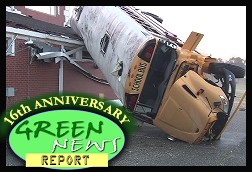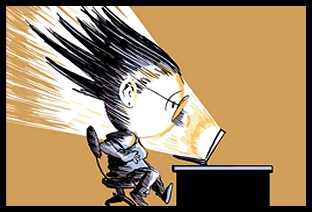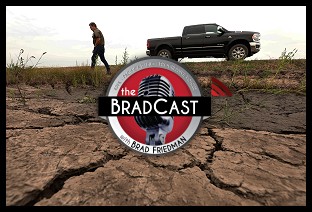Guest Blogged by Alan Breslauer
 Kitty Pilgrim covers a myriad of e-voting problems pouring in from across the country during early voting. Sequoia gets the lion's share of the coverage with the newly discovered large yellow button that, when pressed, allows voters to vote as many times as they want. Dobbs: "I keep expecting the country to just sort of go into a group scream over these e-voting machines."
Kitty Pilgrim covers a myriad of e-voting problems pouring in from across the country during early voting. Sequoia gets the lion's share of the coverage with the newly discovered large yellow button that, when pressed, allows voters to vote as many times as they want. Dobbs: "I keep expecting the country to just sort of go into a group scream over these e-voting machines."
The text-transcript of Thursday's segment on Lou Dobbs Tonight follows in full...
Kitty Pilgrim reports.
KITTY PILGRIM, CNN CORRESPONDENT (voice-over): You really can't miss it, the yellow button at the back of the Sequoia voting machine. Tens of thousand of machines used in 16 state and Washington, D.C. That button puts the machine in manual mode so anyone can vote and repeatedly cast as many votes as they want.
Activists say it's a major problem.
TOM COURBAT, SAVE R VOTE: I worry about the poll captains having access. They're temporary workers. In many cases there aren't background checks done on them. And it's easy for them to go back there, make those changes, and vote repeatedly and not be noticed.
PILGRIM: Sequoia says this button is a standard and deliberate feature. The California Secretary of State's Office says they have security guidelines to alert poll workers to keep a close watch on the button and any tampering. All across the country, activists have called attention to vulnerabilities on all kinds of electronic voting machines, but few of those vulnerabilities have been fixed.
LOWELL FINLEY, VOTER ACTION: We're at the 11th hour and it's too late to do anything to stop the use of these e-voting machines, but it's not too late for voters to do something about it, and we're here to train volunteers so that they can get out there and observe the process and document, shine a light, on the problem that e-voting is causing in this country.
PILGRIM: All sorts of electronic glitches are showing up, screens display the wrong candidate when a button is pushed. Today in Cuyahoga County, Ohio, large print options didn't work properly, cutting off candidate names and election officials struggled with other electronic snafus.
MICHAEL VU, CUYAHOGA CO. ELECTION OFFICIAL: We just got notice from the Secretary of State's Office today that some voting units will not be reflective of Daylight Savings Time. PILGRIM: Potentially causing the machines to close down early. Technicians from the voting companies are working to sort out the last-minute problems.
(END VIDEOTAPE)
PILGRIM: Today, activists pointed out that Sequoia will again have Venezuelan nationalists as support workers on the electronic machines. That's in Cook County, Illinois. Now, the workers are project managers from Smartmatic, the Venezuelan company that bought Sequoia.
Election officials say they have no way of knowing how many Venezuelans will be there but they've seen some around. Sequoia today said eight to 10 Venezuelan nationals will help with the voting machines during the elections --- Lou.
DOBBS: Hugo Chavez is sending observers and monitors for our election, I take it?
PILGRIM: I --- you know, Venezuelan nationals taking a look at our machines.
DOBBS: Well, that's wonderful. I mean, there are times I keep expecting the country to just sort of go into a group scream over these e-voting machines because it does not make any sense that we could be in this kind of vulnerable, absurd position this close ...
PILGRIM: Activists are in a group scream, and I think it's important that everyone document anything that goes wrong so that it can be known.
DOBBS: Is there a sense among those activists, in particular, we're going to have enough people monitoring these elections to be aware in time that something has happened?
PILGRIM: They are trying to set up hotlines and volunteer organizations.
DOBBS: All right, thank you very much. We'll continue here in just one moment. Stay with us.


 Vets Push Back at Trump, Musk Plan to Slash Health Care, 80K V.A. Jobs: 'BradCast' 3/27/25
Vets Push Back at Trump, Musk Plan to Slash Health Care, 80K V.A. Jobs: 'BradCast' 3/27/25 'Green News Report' 3/27/25
'Green News Report' 3/27/25
 Signal Scandal Worsens for Trump, GOP; Big Election Victories for Dems in PA: 'BradCast' 3/26/25
Signal Scandal Worsens for Trump, GOP; Big Election Victories for Dems in PA: 'BradCast' 3/26/25 'Emptywheel' on Why Trump NatSec Team Should 'Resign in Disgrace' After Signal Chat Debacle: 'BradCast' 3/25/25
'Emptywheel' on Why Trump NatSec Team Should 'Resign in Disgrace' After Signal Chat Debacle: 'BradCast' 3/25/25 'Green News Report' 3/25/25
'Green News Report' 3/25/25 Postal Workers Union Prez: USPS 'Belongs to the People, Not the Billionaires':
Postal Workers Union Prez: USPS 'Belongs to the People, Not the Billionaires': Sunday 'Suddenly Conceivable' Toons
Sunday 'Suddenly Conceivable' Toons We're ALL Voice of America Now: 'BradCast' 3/20/25
We're ALL Voice of America Now: 'BradCast' 3/20/25 'Green News Report' 3/20/25
'Green News Report' 3/20/25 What Trump's 'Timber Production Expansion' Means (and Costs): 'BradCast' 3/19/25
What Trump's 'Timber Production Expansion' Means (and Costs): 'BradCast' 3/19/25 Courts Largely Holding Against Trump, Musk Lawlessness: 'BradCast' 3/18/25
Courts Largely Holding Against Trump, Musk Lawlessness: 'BradCast' 3/18/25 'Green News Report' 3/18/25
'Green News Report' 3/18/25 Chief VOA Reporter on Outlet Falling Silent First Time Since 1942: 'BradCast' 3/17/25
Chief VOA Reporter on Outlet Falling Silent First Time Since 1942: 'BradCast' 3/17/25 Sunday 'The Usual' Toons
Sunday 'The Usual' Toons 'Green News Report' 3/13/25
'Green News Report' 3/13/25 Trump EPA Unveils Plans to Endanger, Sicken Americans: 'BradCast' 3/13/25
Trump EPA Unveils Plans to Endanger, Sicken Americans: 'BradCast' 3/13/25 Trump Nixed Enforce-ment Against 100 Corp. Lawbreakers: 'BradCast' 3/12/25
Trump Nixed Enforce-ment Against 100 Corp. Lawbreakers: 'BradCast' 3/12/25 Bad Day for 'Strongmen': 'BradCast' 3/11
Bad Day for 'Strongmen': 'BradCast' 3/11 WI Election Could Flip Supreme Court Control, Musk Jumps In: 'BradCast' 3/10
WI Election Could Flip Supreme Court Control, Musk Jumps In: 'BradCast' 3/10 'What Else Could a Russian Asset Do That Trump Hasn't?': 'BradCast' 3/6/25
'What Else Could a Russian Asset Do That Trump Hasn't?': 'BradCast' 3/6/25 The Longest, Dullest, Most Lie-Filled 'SOTU' Ever: 'BradCast' 3/5/25
The Longest, Dullest, Most Lie-Filled 'SOTU' Ever: 'BradCast' 3/5/25 Trump Bad for Biz... and Farmers... and Nat'l Parks... and...: 'BradCast' 3/4/25
Trump Bad for Biz... and Farmers... and Nat'l Parks... and...: 'BradCast' 3/4/25 Trump Targeting 50% Cuts, Office Closures at Social Security: 'BradCast' 3/3/25
Trump Targeting 50% Cuts, Office Closures at Social Security: 'BradCast' 3/3/25
 VA GOP VOTER REG FRAUDSTER OFF HOOK
VA GOP VOTER REG FRAUDSTER OFF HOOK Criminal GOP Voter Registration Fraud Probe Expanding in VA
Criminal GOP Voter Registration Fraud Probe Expanding in VA DOJ PROBE SOUGHT AFTER VA ARREST
DOJ PROBE SOUGHT AFTER VA ARREST Arrest in VA: GOP Voter Reg Scandal Widens
Arrest in VA: GOP Voter Reg Scandal Widens ALL TOGETHER: ROVE, SPROUL, KOCHS, RNC
ALL TOGETHER: ROVE, SPROUL, KOCHS, RNC LATimes: RNC's 'Fired' Sproul Working for Repubs in 'as Many as 30 States'
LATimes: RNC's 'Fired' Sproul Working for Repubs in 'as Many as 30 States' 'Fired' Sproul Group 'Cloned', Still Working for Republicans in At Least 10 States
'Fired' Sproul Group 'Cloned', Still Working for Republicans in At Least 10 States FINALLY: FOX ON GOP REG FRAUD SCANDAL
FINALLY: FOX ON GOP REG FRAUD SCANDAL COLORADO FOLLOWS FLORIDA WITH GOP CRIMINAL INVESTIGATION
COLORADO FOLLOWS FLORIDA WITH GOP CRIMINAL INVESTIGATION CRIMINAL PROBE LAUNCHED INTO GOP VOTER REGISTRATION FRAUD SCANDAL IN FL
CRIMINAL PROBE LAUNCHED INTO GOP VOTER REGISTRATION FRAUD SCANDAL IN FL Brad Breaks PA Photo ID & GOP Registration Fraud Scandal News on Hartmann TV
Brad Breaks PA Photo ID & GOP Registration Fraud Scandal News on Hartmann TV  CAUGHT ON TAPE: COORDINATED NATIONWIDE GOP VOTER REG SCAM
CAUGHT ON TAPE: COORDINATED NATIONWIDE GOP VOTER REG SCAM CRIMINAL ELECTION FRAUD COMPLAINT FILED AGAINST GOP 'FRAUD' FIRM
CRIMINAL ELECTION FRAUD COMPLAINT FILED AGAINST GOP 'FRAUD' FIRM RICK SCOTT GETS ROLLED IN GOP REGISTRATION FRAUD SCANDAL
RICK SCOTT GETS ROLLED IN GOP REGISTRATION FRAUD SCANDAL VIDEO: Brad Breaks GOP Reg Fraud Scandal on Hartmann TV
VIDEO: Brad Breaks GOP Reg Fraud Scandal on Hartmann TV RNC FIRES NATIONAL VOTER REGISTRATION FIRM FOR FRAUD
RNC FIRES NATIONAL VOTER REGISTRATION FIRM FOR FRAUD EXCLUSIVE: Intvw w/ FL Official Who First Discovered GOP Reg Fraud
EXCLUSIVE: Intvw w/ FL Official Who First Discovered GOP Reg Fraud GOP REGISTRATION FRAUD FOUND IN FL
GOP REGISTRATION FRAUD FOUND IN FL


































